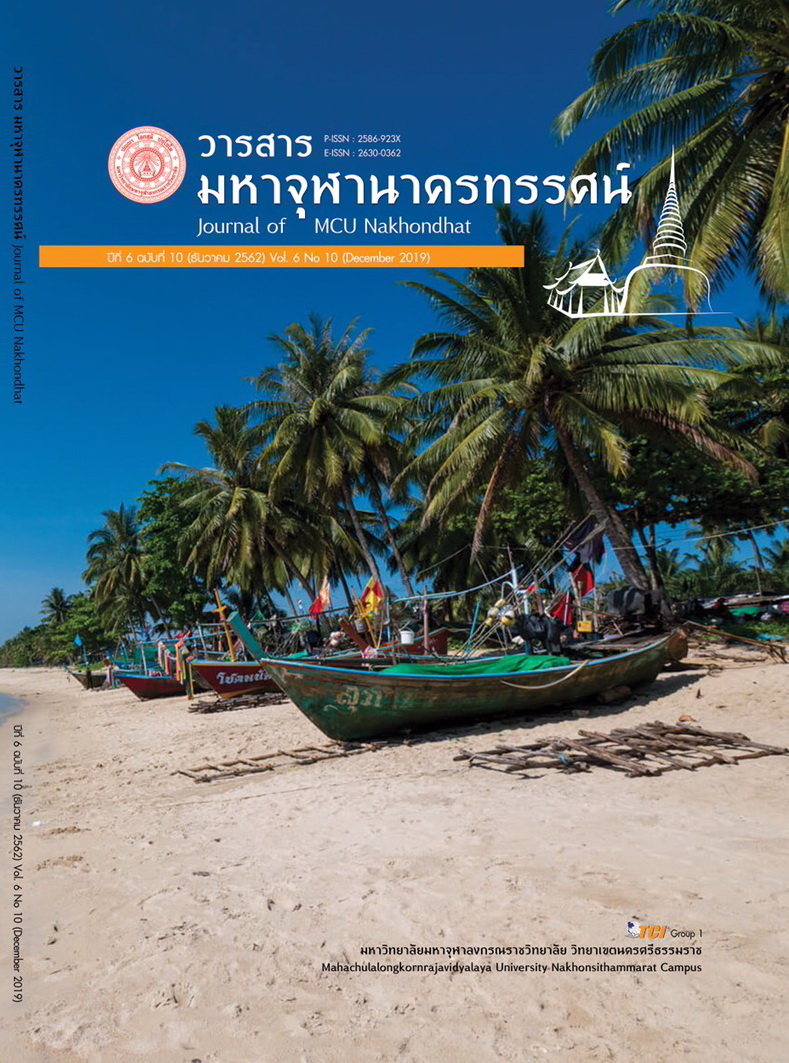THE SOCIAL SKILL DEVELOPMENT MODEL OF HANDS ON IN KNOWLEDGE-BASED SERVICE OF RAJAMANGALA UNIVERSITY OF TECHNOLOGY SUVARNABHUMI
Main Article Content
Abstract
This study is a mixed methods research with an objective to present a model for the development of social skills of hands -on in knowledge base service of Rajamangala University of Technology Suvarnabhumi. The instruments were 375 questionnaires, in-depth interviews of 17 people and group conversations of 12 people. The research found that the model of productivity of hands-on in knowledge base services consisted of social skills which is the ability to adapt, create a positive relationship with others with good human relations, leadership, ability to lead oneself as to build holistic skills in working with others in 5 Qs as follows: IQ (Intelligence Quotient), - Cognitive intelligence in analytical thinking, calculation and reasoning; EQ (Emotional Quotient) - Emotional intelligence to understand emotions of oneself and others and be optimistic as a way of thinking according to the principle of Brahmavihara 4 (kindness, compassion, sympathetic, equanimity) to live together happily with others; SQ (Social Quotient) - Social intelligence to live with others, be open-minded and accept the opinions of others and must not abuse each other; AQ (Advisory Quotient) ; MQ (Merit Quotient) - Ability to challenge problems by using their own intelligence by learning from the happened scenario and taking action to solve various problems without condemning society. For this, hands-on must have merit as a good idea of framework to behave well, goodness from kind heart and ethics which is good behavior that comes from the kind heart of graduates that are caused by the implantation of teaching in university.
Article Details
References
ดาราวรรณ กล่อมเกลี้ยง. (2546). การสร้างแบบวัดทักษะทางสังคมสำรับนักเรียนชั้นมัธยมศึกษาตอนต้น. ใน วิทยานิพนธ์ศึกษาศาสตร์มหาบัณฑิต สาขาการวัดผลการศึกษา. มหาวิทยาลัยศรีนครินทรวิโรฒ.
ปัทมาวดี บุณย์สวัสดิ์. (2553). ผลการใช้เกมการละเล่นพื้นบ้านของไทยที่มีต่อการพัฒนาทักษะทางสังคมของนักเรียนชั้นประถมศึกษาปีที่ 2. ใน วิทยานิพนธ์ครุศาสตรมหาบัณฑิต สาขาวิชาการศึกษาปฐมวัย. จุฬาลงกรณ์มหาวิทยาลัย.
พัชรี ประจญ. (2556). การพัฒนาทักษะทางสังคมของนักเรียนชั้นมัธยมศึกษาปีที่ 1 โดยใช้กิจกรรมสริมสร้างทักษะทางสังคม : ประยุกต์ใช้แนวคิดการประเมินเสริมสร้างพลังอํานาจ. วารสารการวัดผลการศึกษา มหาวิทยาลัยมหาสารคาม, 1(1),78-89.
มหาวิทยาลัยเทคโนโลยีราชมงคลสุวรรณภูมิ. (2560). ประวัติความเป็นมา. เรียกใช้เมื่อ 15 มิถุนายน 2560 จาก https://www.rmutsb.ac.th/2016
วรรณสวัสดิ์ อุทัยพันธ์. (2540). ผลของกลุ่มสัมพันธ์ที่มีต่อการพัฒนาทักษะทางสังคมของนักศึกษาชั้นปีที่ 1 คณะบริหารธุรกิจ มหาวิทยาลัยธุรกิจบัณฑิตย์. ใน วิทยานิพนธ์ศิลปศาสตรมหาบัณฑิต สาขาวิชาจิตวิทยาการศึกษา. มหาวิทยาลัยเกษตรศาสตร์.
สมเกียรติ ตั้งกิจวานิชย์. (2560). บทสำรวจงานวิจัยไทยเรื่อง กับดักรายได้ปานกลาง. เรียกใช้เมื่อ 15 มิถุนายน 2560 จาก http://www.knowledgefarm.in.th.
สุวิทย์ เมษินทรีย์. (2560). ประเทศไทย 4.0 สร้างเศรษฐกิจใหม่. เรียกใช้เมื่อ 10 มิถุนายน 2560 จาก https://www.excise.go.th.
อัจฉรา ไชยูปถัมภ์. (2550). การพัฒนารูปแบบการพัฒนาทักษะทางสังคมสำหรับนิสิตนักศึกษา. ใน วิทยานิพนธ์ครุศาสตรดุษฏีบัณฑิต สาขาวิชาการอุดมศึกษา. จุฬาลงกรณ์มหาวิทยาลัย มหาวิทยาลัย.
อำพัน จารุทัสนางกูร. (2541). การเปรียบเทียบผลของการฝึกทักษะทางสังคมแบบกลุ่ม และแบบรายบุคคลที่มีต่อการแสดงความเห็นอกเห็นใจผู้ป่วยจิตเวชของพยาบาลเทคนโรงพยาบาลสมเด็จเจ้าพระยา. ใน วิทยานิพนธ์การศึกษามหาบัณฑิต สาขาวิชาจิตวิทยาการแนะแนว. มหาวิทยาลัยศรีนครินทรวิโรฒประสานมิตร.
อุษณีย์ โพธิสุข. (2545). สร้างเด็กให้เป็นอัจฉริยะ เล่มที่ 5 : E.Q. ปัญหาหนักของมนุษยชาติ. กรุงเทพมหานคร: มูลนิธสิดศรี – สฤษดิ์วงศ์.
Goleman, Daniel. (1998). Working with emotional intelligence. New York: Bantam Books.
Walthall, J. C.; Konold, T. R.; & Pianta, R. C. (2005). Factor Structure of the social skills rating system across children gender and ethnicity. Journal of Psychoeducational Assessment, 5(1) , 201-215.

